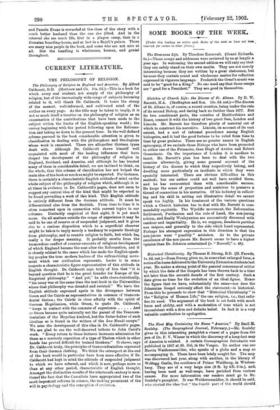C EIRRENT LITERAT ETRE.
THE PHILOSOPHY OF RELIGION.
The Philosophy of Religion in England and America. By Alfred Caldeoott, D.D. (Methuen and Co. 10s. 6d.)—This is a book for which every real student, not simply of the philosophy of religion, but of the increasingly wide range of subjects becoming related to it, will thank Dr. Caldecott. It bears the stamp of the earnest, well-informed, and cultivated mind of the author on every page. As the title may be taken to imply, it is not so much itself a treatise on the philosophy of religion as an examination of the contributions that have been made to the subject within the limits of the English-speaking world ; the survey beginning with the period following upon the Reforma- tion and taking us down to the present time. In the well-defined scheme pursued in the book considerable attention is given to classification in dealing with the philosophers and theologians whose work is examined. There are altogether thirteen types dealt with. Although Dr. Caldecott shows himself well acquainted with most of the leading influences that have shaped the development of the philosophy of religion in England, Scotland, and America, and although he has treated many of them in considerable detail, we are inclined to think, on the whole, that this scheme of classification has not helped the main idea of the book so much as might be expected. For instance, there is certainly a characteristic English attitude of mind on the whole subject of the philosophy of religion which, although it is at times in evidence in Dr. Caldecott's pages, does not seem to suggest any central idea of the kind that might be expected to be found pervading a work of this kind. This English attitude is entirely different from the German attitude. It must be differentiated also from the Scottish. From time to time it is often remarked upon in connection with current topics in our columns. Distinctly empirical at first sight, it is yet much more. On all matters outside the range of experience it may be said to be one of reserve or of suspended judgment, and it gives rise to a curious disposition which to a superficial observer might be taken to imply merely a tendency to separate theology from philosophy, and to reunite religion to faith, but which has really a far deeper meaning. It probably results from the tremendous conflict of counter-currents of religious development of which England became the seat after the Reformation, and it is closely related to the cause which has made the English-speak- ing peoples the true modern leaders of the enfranchising move- ment which our civilisation represents. Locke is in some respects a characteristic figure representative of this attitude in English thought. Dr. Caldecott says truly of him that "it is beyond question that he is the great founder for Europe of the Empirical philosophy." "And yet," he adds characteristically, " his essay was at the same time the text-book in the Universities where that philosophy was dreaded and resisted." We have the English attitude expressed again in the divergence between Green and the Cairds as representatives in common of transcen- dental theism ; the Cairds in close affinity with the spirit of German Hegelianism, while Green, to quote Dr. Caldecott,
"keeps in contact with the concrete of experience And so Green became quite naturally not the parent of the Transcen- dentalists of the Hegelian kindred, but the foster-father of such idealism as is found in the writers of the Lux Mundi essays." We miss the development of this idea in Dr. Caldecott's pages. We are glad to see the well-deserved tribute to John Caird's work. "Every return to these lectures increases admiration for them as a masterly exposition of a type of Theism which in other hands has proved difficult for trained thinkers." It shows, says Dr. Caldecott truly, the principles of transcendentalism separated from their German clothing. We think the retrospect at the end of the book would in particular have been more effective if Dr. Caldecott had kept in mind the attitude of suspended judgment to which we have referred, and which is now, perhaps more so than at any other period, characteristic of English thought. Amongst the distinctive results of the nineteenth century is men- tioned the fact that the Causalists have appropriated two of the most impoletant reforms in ocience, the making prominent of the will in psychology and the conception of evolution.










































 Previous page
Previous page